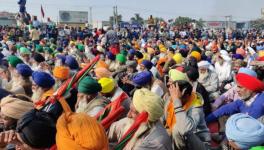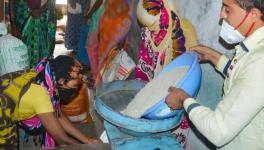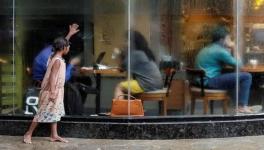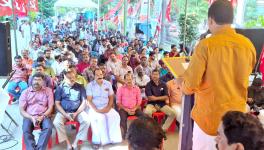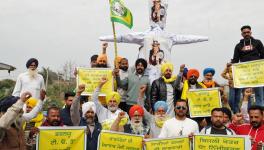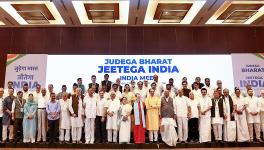With Community Kitchens and Food Kits, Kerala Progresses towards Hunger-Free Status amid Pandemic
“Nobody should go hungry,” announced Kerala Chief Minister Pinarayi Vijayan in March this year during the initial days of the Covid-19 lockdown. This decision of the state government has led to setting up of community kitchens in all panchayats across the state along with distribution of free food kits to all.
So far, over 2.85 crore food kits have been distributed and the initiative is continuing.
In the wake of the Covid-19 pandemic, the state government in the first week of April had begun distributing food kits with essential food grains and other items. The distribution of kits was done in a phased manner. Five lakh beneficiaries from the Antyodaya (the poorest) category had been given top priority and then came 31 lakh households holding pink ration cards. People from non-priority categories had also been given the kits.
Over 87.14 lakh ration card owners in the state had been given these free kits ensuring food security during the lockdown. Each kit contained 1 kg sunflower oil, ½ kg coconut oil, 1 kg salt, 1kg semolina, 1kg green gram, 1 kg black chana, 1/4kg tur dal, 100 gm mustard, 100 gm fenugreek, 100 gm coriander, 1 kg urad dal, 100 gm chilli powder, 1 kg sugar, 250 gm tea powder and 2 soaps.
Later, the government had introduced special kits for migrant workers who reside across the state. Further, all ration card holders in the state were given a special food kit at the occasion of Onam.
Following this, the state government in September this year had decided to extend the distribution of free grocery kits through the Public Distribution Systems (PDS) for all ration card holders in the state for four more months—from September to December—as part of a 100-day programme. In December, the government plans to give a Christmas kit with more items.
The Left Front government in the state has spent around Rs 3,000 crore for food kits till October.
In the initial days of lockdown, the community kitchens were a huge relief for the needy people. Panchayats were held directly responsible for managing the community kitchens and the state civil supplies provided groceries required for that.
“Some people may find it tough to ask for food from others even if they are hungry. But if the government provides a number, anybody can call that number freely,'' said CM Vijayan while announcing the decision to start community kitchens in every panchayat across the state.
“Also, there are people who cannot cook food at home— because of old age or illness or because they are differently-abled. They should not go hungry during the lockdown. The local bodies should ensure they get food,'' Vijayan added.
All these steps and efforts are being taken as part of the state government ambitious drive to convert Kerala to a hunger-free state. The state government had already introduced a hunger-free city project. It aims to provide highly subsidised meals once a day to the public at designated centres in a city and it is aimed at ensuring that no person goes without at least one square meal a day.
In February, Finance Minister TM Thomas Isaac had announced in the budget the plan of setting up 1000 ‘janakeeya’ hotels, one each in every local body, that will serve subsidised meals at Rs 20. The pilot project was successfully implemented in his own constituency Alappuzha through a restaurant ran by a local cooperative.
While presenting the 2020-21 state budget, Isaac had announced that the government would open 1,000 common man's kitchens serving subsidised meals across the state. Currently, a total of 767 such budget kitchens--both in urban and village areas—are operating in the state, according to Nishanth, programme coordinator of Kudumbashree (a poverty eradication and women empowerment programme). He added that the project was implemented with the support of the local self-government and Civil Supplies departments.
These 'Janakeeya Hotels', which have sprung up across the state, are run by the all-women network Kudumbashree, and an average of 70,000 meals are sold daily at the rate of Rs 20 each between 12 noon and 3 pm every day. The standard meal includes rice, sambar/dal, upperi (stir-fried vegetables), pickle and papad. Fish, beef, eggs and pork are also served at reasonable rates.
Kudumbashree is a poverty eradication mission and one of the most successful women empowerment models of the state government. The meal packets, sold by the Kudumbashree volunteers through these budget kitchens or hotels has been a big hit among commoners during the time of lockdown.
Kudumabshree executive director, S Harikishore said it was a historic achievement as the total number of the budget hotels has crossed the 700-mark despite the COVID-19 pandemic and the lockdown.
"We have proved that we can ensure quality food for people at this humble rate even during the time of lockdown," he told PTI. "And we are proud that we can ensure steady income for over 3,000 Kudumbashree volunteers (all women) through these hotels," he said.
Even when many places were declared containment zones due to the pandemic, the volunteers delivered food packets without a fail. "We have proved that our hotels can act as nodal points to deliver food packets even when a place is declared as a containment zone," the official added.
Padmavathy, a 66-year-old house-help working in several homes in the capital city, said the hotel was a huge relief for her on many days during the pandemic. "At a time when the infection had started spreading on a larger scale, many families were not keen to allow housemaids in their premises due to the risk of the disease spread. It was a big blow to people like me who depend on daily earnings. At that time, the Janakeeya hotels were a huge relief as we got good meals at just Rs 20," she said.
These budget hotels had begun delivery of meal packets at the doorstep of the needy during the lockdown. For that, they charge Rs 5 extra for each packet, taking the total amount to Rs 25.
Beside the subsidy of Rs 10 provided by the Kudumbashree for each meal, Rs 30,000 is provided by the municipal corporations as grant for hotels to be set up in urban areas, and Rs 20,000 by the block panchayat for hotels in village areas. The land/rent amount, electricity and water for the hotels are provided free of cost by the respective local self-government institutions.
(With Inputs from PTI)
Get the latest reports & analysis with people's perspective on Protests, movements & deep analytical videos, discussions of the current affairs in your Telegram app. Subscribe to NewsClick's Telegram channel & get Real-Time updates on stories, as they get published on our website.









